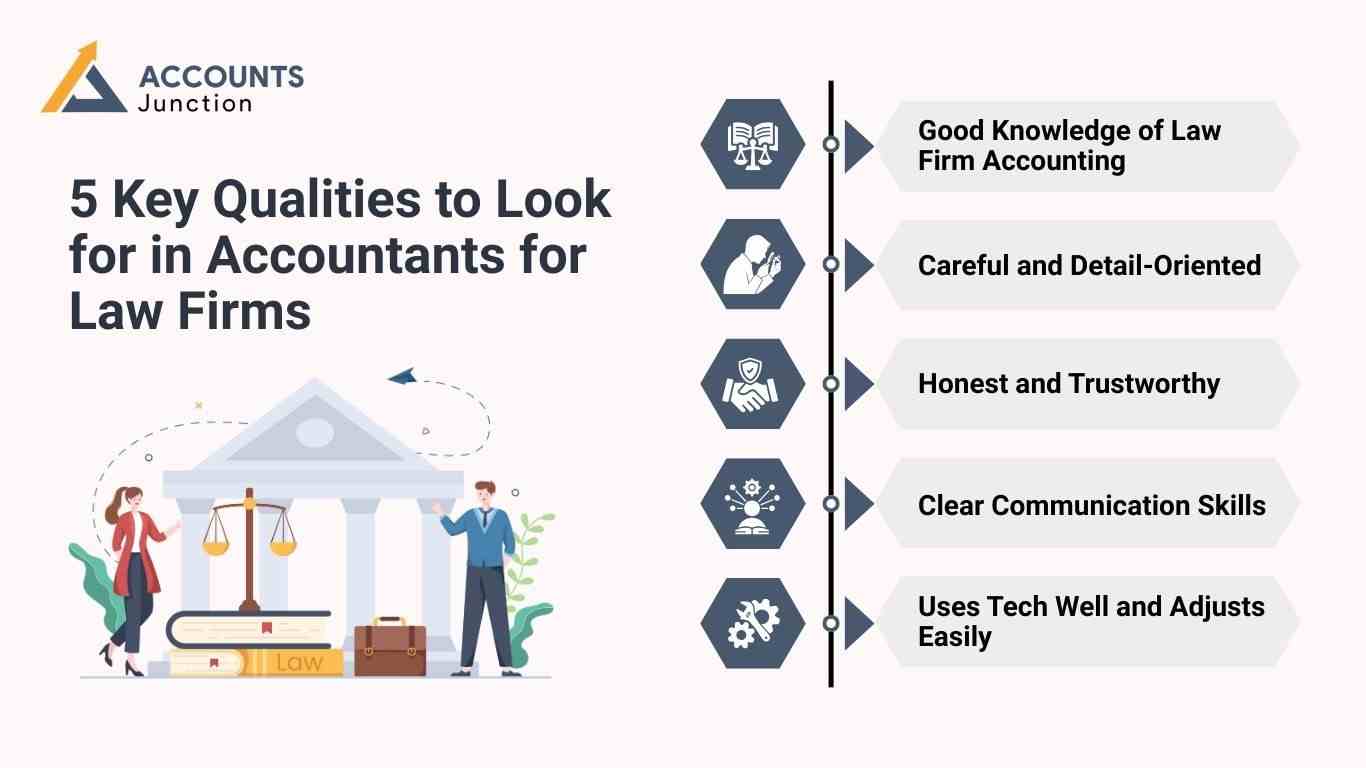
5 Key Qualities to Look for in Accountants for Law Firms
Finding the right Accountants for law firms is very important. Lawyers spend their time on cases, but money matters need equal care. The right accountant helps keep books correct, track income and costs, manage payroll, and handle taxes. They also know the rules that apply to law firms, which makes audits and reports easier. A good accountant saves time, cuts errors, and gives clear advice. In this blog, we will explain the five main qualities to look for in accountants for law firms so your practice can stay strong, compliant, and stress-free.
Why Good Accountants Are Needed in Law Firms
Law firms manage client funds, fees, and bills. Small mistakes can lead to trouble. Skilled accountants for law firms make sure money is tracked correctly.
Keep Money Records Correct
- Law firms have many client accounts and bills. Accountants track each payment and expense. They keep books clear and correct.
Follow the Rules
- Law firms have strict rules about client money. Expert accountants make sure the firm follows all rules. This avoids fines or penalties.
Save Time
- When accountants handle money, lawyers can focus on their work. This saves time and makes the firm run smoothly.
Key Qualities to Look for
Finding the right Accountants for law firms is very important. Lawyers focus on cases, but managing money and client funds needs experts who keep accounts correct and follow all rules.
1. Good Knowledge of Law Firm Accounting
Accountants for law firms must know all the rules that apply to legal practices.. They track client funds, case costs, and fees. This keeps all money records correct and prevents mistakes in client accounts.
-
Track Client Funds
They keep client money separate from firm money. Proper tracking stops errors and protects client funds.
-
Understand Billing
They know lawyer billing methods, such as retainers and hourly fees, ensuring invoices are right and easy to read.
-
Track Case Costs
Accountants record court fees and case expenses correctly. This keeps books clear and helps lawyers manage client costs.
2. Careful and Detail-Oriented
Accuracy is key. Accountants check every payment, invoice, and ledger to avoid mistakes. Careful work ensures client accounts are correct at all times.
-
Review Records
They check each transaction to keep the books exact and up to date.
-
Reconcile Accounts
Client and firm accounts are often compared to find errors early and prevent problems.
-
Spot Errors Early
Detail-focused accountants see mistakes before they grow, protecting client funds and the firm’s rules.
3. Honest and Trustworthy
Handling client money needs honesty. Accountants for law firms follow rules and act fairly to keep client trust and protect the firm’s reputation.
-
Keep Data Private
All client financial data is kept safe. Accountants protect records and maintain client trust.
-
Follow Rules
They follow law firm rules carefully, avoiding legal or ethical problems while handling funds.
-
Build Client Trust
Honest accountants help lawyers gain client confidence, as clients feel safe knowing their money is in good hands.
4. Clear Communication Skills
Accountants must explain numbers in simple words. Clear communication helps lawyers understand reports and make smart decisions.
-
Easy-to-Read Reports
They prepare reports in plain words so lawyers can track expenses and revenue without confusion.
-
Advice on Money
Accountants give advice on budgets, spending, and cash flow, helping firms make smart decisions.
-
Work with Staff
They coordinate with lawyers and staff to ensure financial tasks are done correctly and smoothly.
5. Uses Tech Well and Adjusts Easily
Modern law firms use software and automation. Accountants must know tools that make work faster, more correct, and easier to manage.
They know programs like QuickBooks, Xero, or Clio to track accounts, payments, and invoices efficiently.
-
Use Automation
Automation handles routine tasks like billing and expense tracking, saving time and reducing errors.
-
Stay Updated
Good accountants learn new rules and technology to keep client accounts safe and follow all firm rules.
Extra Qualities That Help
Some traits make Accountants for law firms even more valuable. These qualities help them solve problems, stay organized, think clearly, and support lawyers in running the firm smoothly.
-
Solve Problems
Good accountants can find answers to tricky money issues fast. They fix mistakes, handle unusual payments, and make sure client funds are tracked correctly without causing delays or errors.
-
Stay Organized
They keep files, accounts, and reports tidy. Organized accountants can find information quickly, track client funds, and make sure all money work is accurate and easy to review.
-
Think Clearly
Accountants notice patterns in money and see risks. They give simple advice to help lawyers plan budgets, control spending, and manage client funds safely and correctly.
-
Work Well with Others
They work with lawyers, staff, and clients. Accountants who get along well help keep work smooth, share money updates clearly, and track client funds the right way.
-
Plan Ahead
Good accountants can plan for future costs and cash needs. They help lawyers see what money is needed, avoid shortages, and make smart choices for the firm’s growth.

How to Pick Accountants for Law Firms
Choosing the right Accountants for law firms is very important. Pick carefully to get the best results. Good accountants keep client funds safe, track money well, and follow all rules.
-
Check Experience
Choose accountants who have worked with law firms before. Ask for references. Experienced accountants know how to track client funds, manage bills, and keep books correct at all times.
-
Look for Skills
Accountants should know simple software and law firm billing methods. They must track payments, retainers, and expenses clearly. Skilled accountants make reports easy to read and understand.
-
Check Communication
Good accountants explain money matters in simple words. They give clear updates and work with lawyers and staff. Everyone can understand reports and manage funds without confusion.
-
Review Ethics
Ask how accountants keep client money safe and follow rules. Honest accountants respect privacy, manage trust accounts correctly, and make sure the firm follows all legal and money rules.
Benefits of hiring a skilled accountants
Hiring skilled Accountants for law firms brings many advantages. They keep money records correct, follow rules, give clear advice, and make lawyers’ work easier every day.
1. Money Records Are Correct
Good accountants track all payments, invoices, and client funds carefully. This stops mistakes, keeps books accurate, and ensures client money never mixes with firm money.
2. Follow All Rules
Accountants help the firm follow trust account rules and tax rules. They make sure all money work is correct, avoiding fines, penalties, or legal trouble.
3. Help Decisions
They make clear money reports. Lawyers can use these reports to plan budgets, track cash, and make better choices for the firm’s growth and spending.
4. Make Lawyers’ Work Easy
Lawyers can focus on cases while accountants track client money, invoices, and spending. Delegating money work saves time, reduces stress, and keeps the firm running smoothly.
Future Trends in Law Firm Accounting
Accounting is changing fast. Firms that use new tools and software save time and avoid mistakes. Cloud access, tech help, and secure systems make money work easier and safer.
-
Cloud Accounting
Cloud tools let accountants track money from anywhere. They can see client funds, manage bills, and check accounts anytime without being in the office.
-
Use Tools
New tools handle tasks like invoices, spending, and reports. Using tech saves time and makes accounting fast and accurate.
-
Keep Data Safe
Accountants protect client money and information with secure systems. Safe records prevent theft, keep data private, and help the firm follow all rules.
Hiring skilled accountants brings real value. Good Accountants for law firms keep money safe, make reports clear, and help lawyers focus on cases. They save time, cut errors, and make the firm run smoothly.
At Accounts Junction, we know that managing client funds and keeping records correct is key for law firms. Our accounting services meet the needs of legal practices. We help with bookkeeping, follow all rules, and give clear financial reports. With our support, law firms can give full attention to clients and cases, knowing their finances are well managed.
FAQs
1. Why do law firms need accountants?
- Accountants for law firms track client money, keep books correct, and follow rules to avoid mistakes.
2. What makes an accountant good for law firms?
- They are careful, honest, clear in reports, and know law firm rules.
3. How do accountants keep client funds safe?
- They track each payment, separate funds, and check accounts for mistakes.
4. How can accountants save lawyers time?
- They handle money work so lawyers can focus on cases. Skilled Accountants for law firms make this simple and accurate.
5. What tools do accountants use?
- They use QuickBooks, Xero, Clio, and cloud systems for fast and safe tracking.
6. How do accountants help with billing?
- They make invoices correct, clear, and sent on time to avoid disputes.
7. Can accountants help law firms grow?
- Yes. They provide reports, help plan budgets, and track spending for growth.
8. How can I know if an accountant follows rules?
- Check their methods for trust accounts, reports, and legal compliance.
9. How often should accountants check accounts?
- They should review records and payments each month to catch errors fast.
10. Can accountants advise on budgets?
- Yes. They guide firms on spending, cash flow, and cost control.
11. Are cloud systems safe for law firm accounting?
- Yes. Cloud tools keep data secure and give instant access to money records.
12. How do accountants handle client invoices?
- They track payments, mark received funds, and send clear, correct invoices.
13. What qualifications should law firm accountants have?
- They need a degree or certificate and law firm experience.
14. Can accountants help with taxes for law firms?
- Yes. They prepare taxes and track costs according to the rules.
15. How do accountants handle multiple clients?
- They track each client’s payments and costs alone.
16. Can accountants improve cash flow?
- Yes. They track money, guide spending, and plan budgets.
17. Do accountants help in audits?
- Yes. They keep records ready and guide firms during checks.
18. How do accountants stay updated with rules?
- They follow laws, take training, and use new tools.
